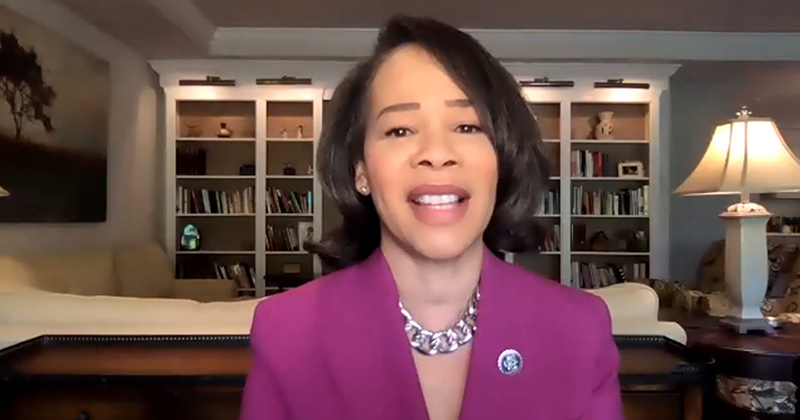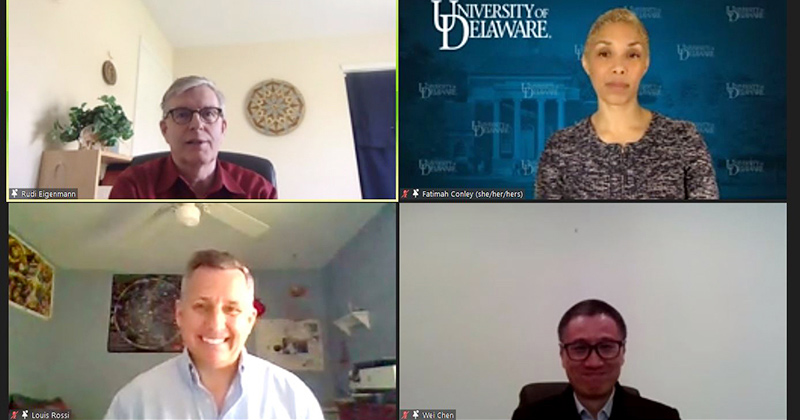


U.S. Rep. Blunt Rochester addresses graduate students
Photos by Adam S. Kamras May 25, 2021
UD alumna opened the 10th annual Graduate Students’ Forum for Research and Creative Endeavors
Having put herself through graduate school at the University of Delaware while working full time and raising two young children, U.S. Rep. Lisa Blunt Rochester can relate to some of the hurdles being faced by the students she addressed during her opening remarks of UD’s 10th annual Graduate Students’ Forum for Research and Creative Endeavors.
After being introduced to the virtual event’s participants by UD President Dennis Assanis, Blunt Rochester reflected on the support she received at UD — especially from the Graduate College’s Mary Martin — en route to her 2002 master of arts degree in urban affairs and public policy and emphasized the importance of the work being done by today’s students in a challenging environment.
“Your research and the skills you are attaining are more relevant today than at any other time in history,” said Blunt Rochester. “The research informs practice as much as practice informs research. What you learn and contribute matters to the world.”
Forum focuses on students’ journeys
Drawing on the forum’s theme, “Succeeding in a Virtual World: Advancing Your Research and Career Journey,” Blunt Rochester said the key word to her is “journey.” Citing the life-changing events since March 2020, including the COVID-19 pandemic, the death of George Floyd, Asian hate and the insurrection at the U.S. Capitol — where she was trapped in the gallery of the House of Representatives balcony — she said we sometimes take detours on our journey and hope everything that has occurred will put us on a new and better path.
“This moment is a moment of transformation for us and a moment for us to really create the world we want to see,” said Blunt Rochester. “That’s why your education is so important.”
Keynote panelists share tips
Blunt Rochester set the stage for the forum’s keynote panel, featuring Wei Chen, managing director, head of credit strategy and analytics at Barclays; Fatimah Conley, UD’s interim chief diversity officer; Rudolf Eigenmann, UD professor of electrical and computer engineering and leader of DARWIN (Delaware Advanced Research Workforce and Innovation Network); and Louis Rossi, dean of UD’s Graduate College and vice provost for graduate and professional education.

Though Conley and Rossi were already employed by the University of Delaware, they both assumed their current leadership roles in the midst of the pandemic and have been leading their teams virtually. To make up for the absence of casual, informal, face-to-face contacts, Rossi has regularly made himself available in a Zoom room for conversation and hosts monthly coffee huddles.
Conley acknowledged it can be challenging to connect with people who have Zoom fatigue, COVID fatigue and other types of fatigue over a computer screen on personal and emotional issues like social justice and recommends giving others grace.
“I tell my staff and anybody I’m working with, show up however you would like to,” said Conley. “Show up in a hoodie, sweatpants. It’s really about the ideas, the connection, the communication.”
Increasing efficiency virtually
Chen began his position at Barclays in February 2020 and had a brief opportunity to meet his new colleagues in person just before they began working from home. He said it has been a fascinating phenomenon to see how much ground can be covered in a day by jumping from one 15-minute virtual meeting to another.
“I don’t think any of us thought that because we couldn’t work together in the same location that we could actually have a lot more conversations,” said Chen. “It speaks to a lot that we as people really want to get things done, so whatever the situation is we make the most out of it and that sometimes forces a bit more of creativity.”
Eigenmann has also been impressed with how many tasks could not only be done fairly efficiently but sometimes even more efficiently via virtual communication. He encourages everyone to enjoy the benefits of being at home like talking with a family member during a break and fixing a snack in their kitchen. At least once a week, he allots fun time in his classes for lighthearted topics of discussion such as what animal would you want to be if you were an animal.
Maintaining work-life balance
Rossi, who tries to get outside as much as he can, said working from home blurs the boundary between work and the rest of your life and it takes intentional effort to maintain that separation.
“If you go for a walk every morning, do it,” said Rossi. “Even if you find that you are stressed and can get one extra thing done by giving up that walk, don’t give it up. You’re at your best when you are balanced.”
Conducting impactful research
With all the advancements and changes that have been necessitated by the events of the last year-plus, and those that will continue to be developed, it is crucial for society to benefit from the research and other work being done in academia.
“Part of the secret sauce to impact and success is practice, practice and practice again to express what you do to different audiences,” said Eigenmann. “Have an elevator pitch. Make sure you can explain to the right audience in 30 seconds what you do.”
Conley advised the students not to just use research publications and other areas of academia to share what they are accomplishing. She said that reaching a larger population could stimulate additional interest and cross-cultural dialogue.
“Take all of the wonderful things that you are doing and try to funnel them into the mainstream media as much as you can,” said Conley.
Additional advice throughout the week
The Graduate Students’ Forum was preceded by a four-day Professional Development Week that consisted of a series of workshops designed to assist students in securing employment and excelling in their careers. Along with hearing from professionals from a variety of sectors, sessions were held on writing resumes and cover letters, interviewing best practices, and job searching for international students.
Be passionate and enthusiastic
Throughout the Professional Development Week and the Graduate Students’ Forum, students were continually reminded to be passionate and enthusiastic. For many job applicants, this expression of excitement begins with the resume and cover letter, which several of the panelists emphasized should be specifically tailored to the position being applied for.
“A cover letter really allows me to imagine you in the position because you’re telling me why it is that you think you’re a fit for this role, so I don’t have to do as much imagination because you’ve already told me,” said Adetoun Adeniji-Adele, hiring manager for Integral Molecular. “And if you’ve done that, you’ve taken a lot of that work that I need to do to determine whether or not I should even pick up the phone and talk to you.”
When Adeniji-Adele invites applicants to interview, she is looking for that spirit to continue.
“You can be the best candidate, but if you can’t convey that and why you are either enthusiastic about the work you did previously or the work that you you’re trying to do now and or the company, then why should the company hire you versus another candidate,” said Adeniji-Adele.
Love what you do
While a well-written resume and cover letter might get the candidate’s foot in the door, and an energetic interview can lead to a job offer, several presenters reminded the students that career happiness and success can be realized by having that same enthusiasm for the work they end up doing.
“Whether it’s industry, whether it’s academia, whether it’s politics, pursue your passion and try and make a difference in the world, and to me that’s the most important thing,” said Yoram Cohen, who earned his doctorate at the University of Delaware in chemical engineering and has been a professor at UCLA for nearly 40 years.
Chen said that by having passionate goals for ourselves, we will get up every morning ready to go to work.
“Really look for something that you’re passionate about,” said Chen. “That will keep you going when things are great and when things are tough.”
Student awards
To conclude the week of educational activities, UD’s graduate students were given a chance to show what they have been learning through oral and poster presentations. Negin Mohammahmirzaei (psychological and brain sciences) won the best poster award, while Andria Farrens (biomedical engineering), Ishti Mahbub (mechanical engineering) and Dylan Haywood (sociology and criminal justice) had the first-, second- and third-place oral presentations, respectively.
Contact Us
Have a UDaily story idea?
Contact us at ocm@udel.edu
Members of the press
Contact us at 302-831-NEWS or visit the Media Relations website

